We use audience measurement tools (such as Google Analytics 4 and Clarity), via Google Tag Manager, to understand how the website is used and to improve it. The data are used for statistical purposes only and are not used for targeted advertising.
Once upon a time FSD…
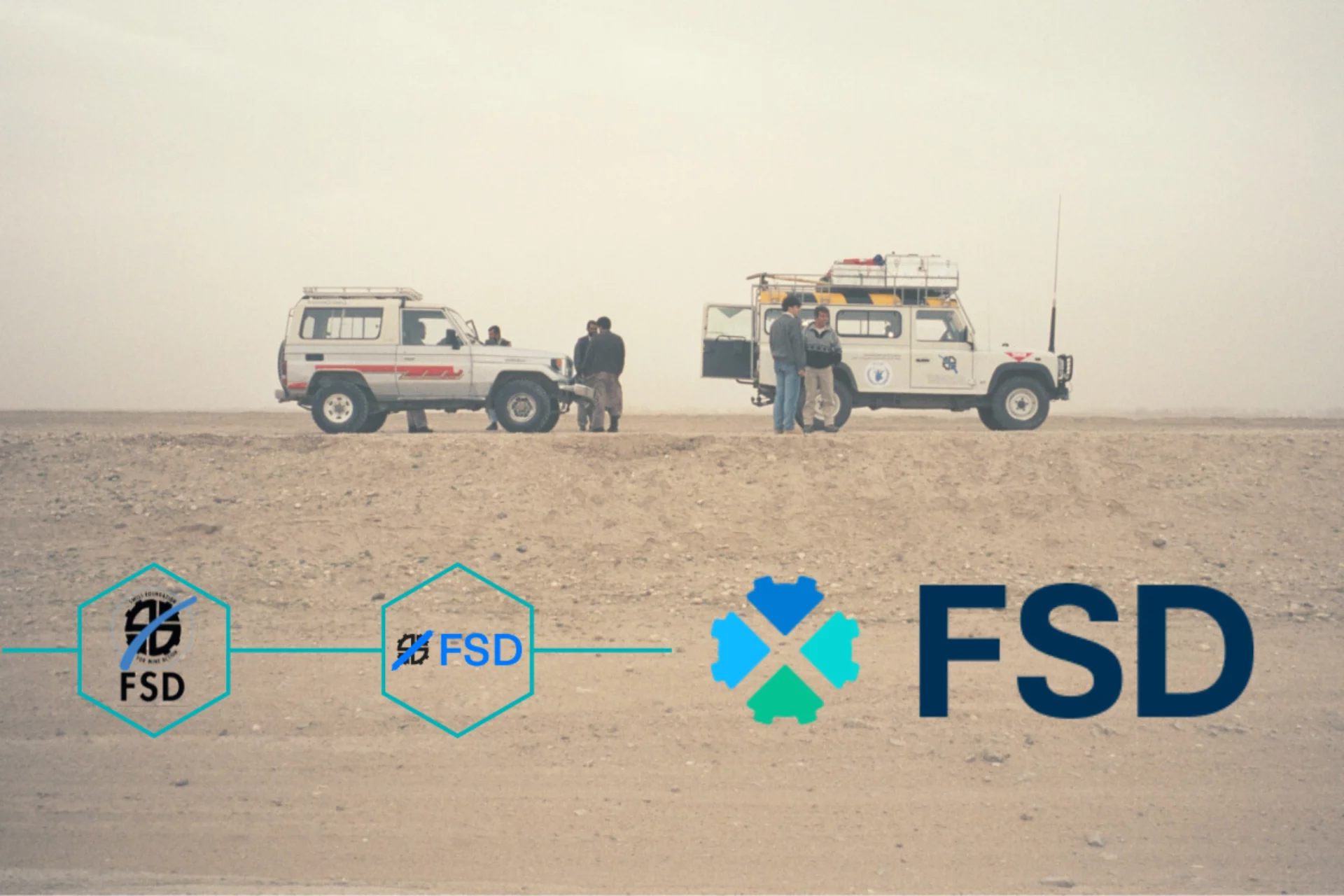
Since its creation, FSD has protected civilians from landmines and explosive remnants of war. From Bosnia to Ukraine, it has trained thousands of deminers, secured roads and infrastructure, innovated with drones and machinery, and worked beyond demining to support communities and peace processes.
The story begins in the Swiss city of Fribourg. In the 1990s, millions of people saw on their TV screens images of countries contaminated by anti-personnel mines and their dramatic effects on the population. In 1997, the issue became a major international concern leading to the adoption of the Ottawa Mine Ban Treaty. A handful of Swiss citizens, the majority of whom had a humanitarian background, founded the Fédération suisse de déminage (Swiss Federation for Mine Action).
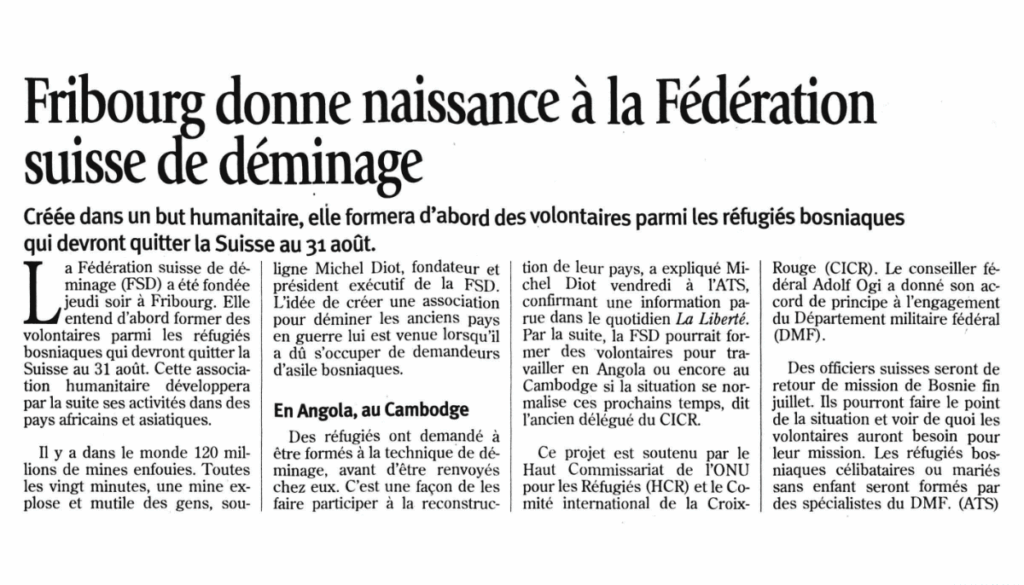
FSD’s first mine action project began a few months later in Bosnia-Herzegovina. It involved clearing a part of the Olympic village of Dobrinja, where the front line ran.
FSD then extended its mine clearance activities to other countries, notably at the request of the World Food Programme, leading to an agreement in 2001. It specified that FSD’s emergency response teams are on standby within 72 hours to ensure emergency food distribution to the civilian population in any potentially mined area. This includes securing key roads and infrastructure in Iraq, Afghanistan, Sudan and South Sudan to ensure safe food distribution in the most volatile contexts.

At the start of 2003, Fédération suisse de déminage became Fondation suisse de déminage FSD (Swiss Foundation for Mine Action) and continued its humanitarian work in countries affected by armed conflicts. Large-scale operations are carried out in heavily contaminated countries such as Albania, Lebanon, Laos and Sri Lanka. Over the years, FSD has trained thousands of deminers all around the world.
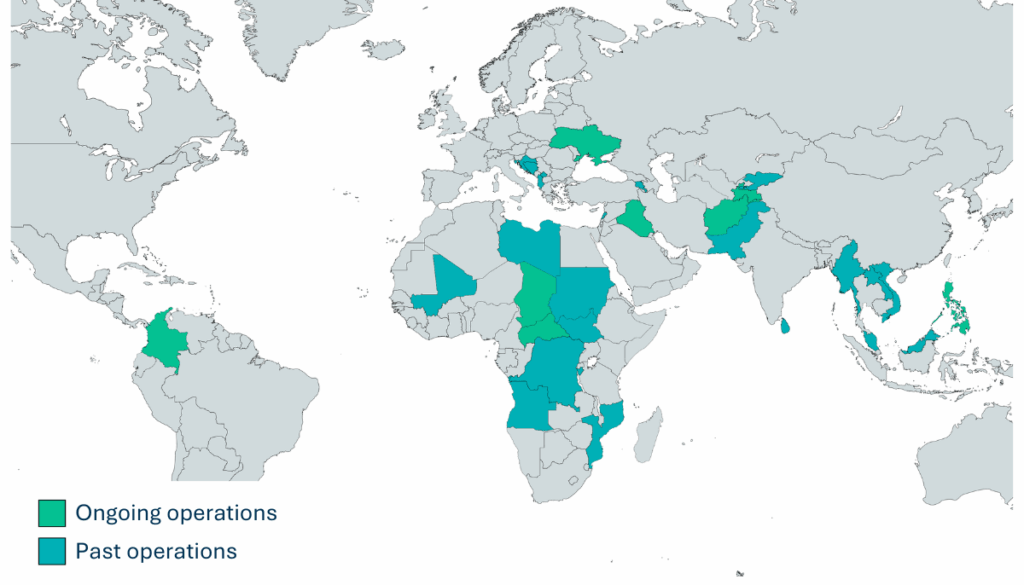
Specialised in emergency situations, FSD’s field teams occasionally carry out humanitarian activities that go beyond mine action, such as in the aftermath of the tsunami in Sri Lanka in 2004. FSD decided to suspend its mine action programme so that all its staff, ambulances and other vehicles would be available to help the people affected by the natural disaster.
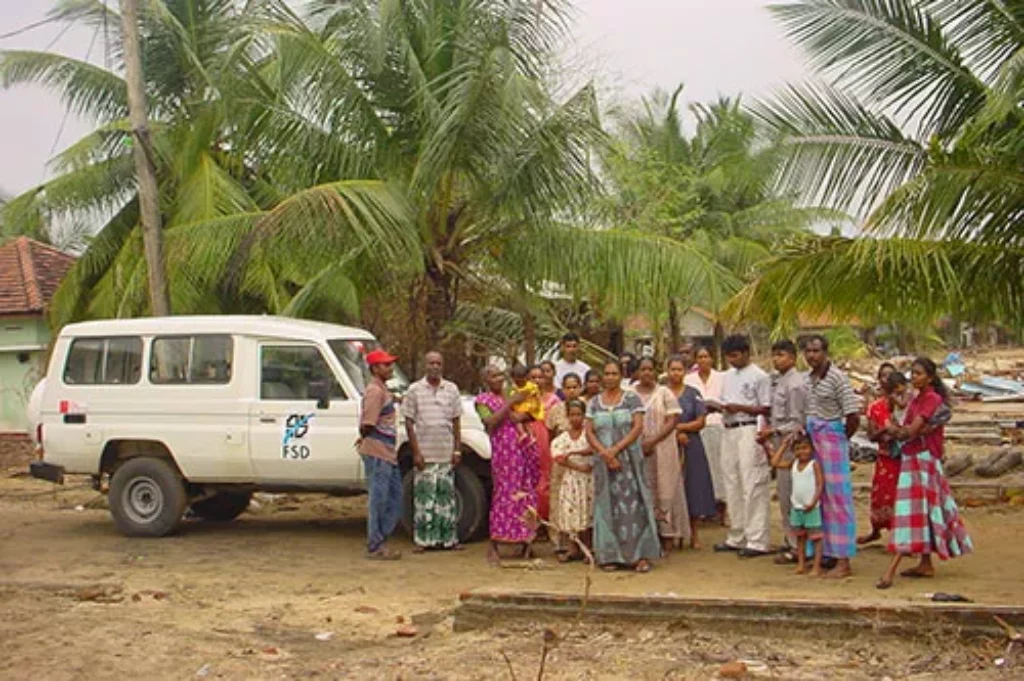
Over the years, FSD’s expertise has grown, and mine action techniques have evolved. FSD invests in machinery and new technologies to support manual mine clearing operations. Since 2003, mechanical ground preparation machines have been deployed during mine action programmes.

FSD was also involved in research projects on the use of drones in mine action since 2008.
As the list of FSD’s operations in countries expands, new activities complementing mine action are being implemented. Local capacity-building programmes were conducted in several countries, including Mozambique and Armenia. In 2009, a programme to destroy obsolete stocks of obsolete weapons and ammunition was launched in Tajikistan.
FSD operates in challenging contexts, where the population’s needs are not limited to mine clearance. The organisation therefore moved in step with the direction of the SDGs and the humanitarian development peace nexus. An environmental remediation programme was launched in 2012 in Kyrgyzstan, starting with assessments of soil pollution levels deriving from extractive mines.
FSD then carried out several projects to clean up former uranium mining sites in Tajikistan and Kyrgyzstan, and has focused on the remediation of sites contaminated by toxic pesticides since 2016.

At the same time, projects to assist ongoing peace processes took shape. In 2015, FSD began its programme supporting the disarmament, demobilisation and rehabilitation process of former combatants in the Central African Republic.
In the Philippines, in the western part of the island of Mindanao, FSD uses mine action as a mediation tool between former belligerents. Socio-economic support projects are also implemented in countries affected by armed conflict to provide assistance to the most vulnerable communities.
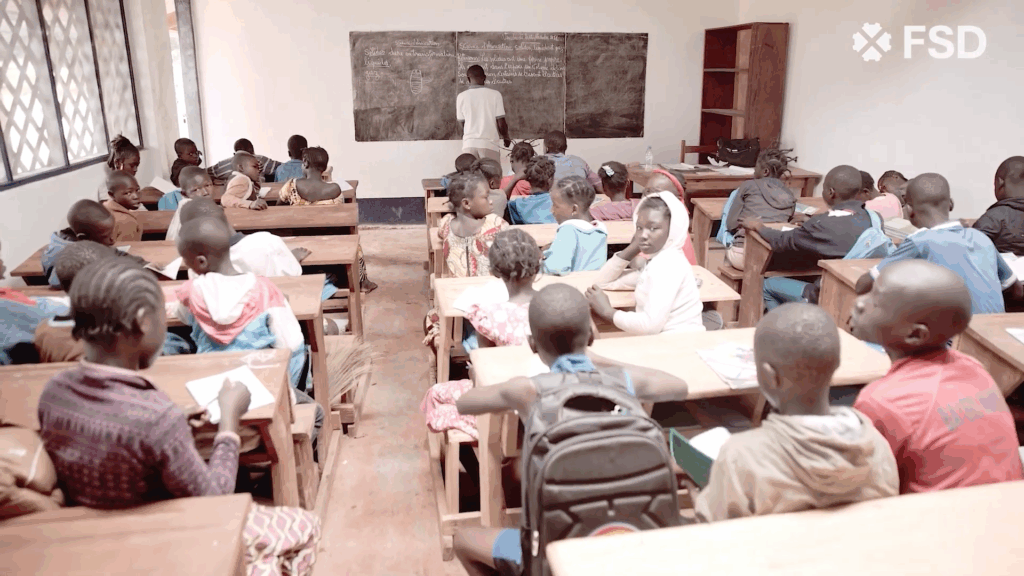
As part of its humanitarian mine action programmes, FSD is working to develop national mine clearance expertise, thus enabling local actors to take over the implementation of an effective and sustainable mine action strategy.

Between 1997 and 2022, FSD has been active in 29 countries and has returned 450 km2 of cleared land to communities, with nearly 1.4 million items of explosive ordnance destroyed. Currently, FSD employs over 500 staff in eight countries, working day in and day out to make the world safer.
FSD’s humanitarian work has been carried out for 25 years thanks to the generous support of public and private donors, who are committed to our work on an ad hoc or long-term basis.
A huge thank you to all of you! Each neutralized mine potentially represents a life saved.
View all
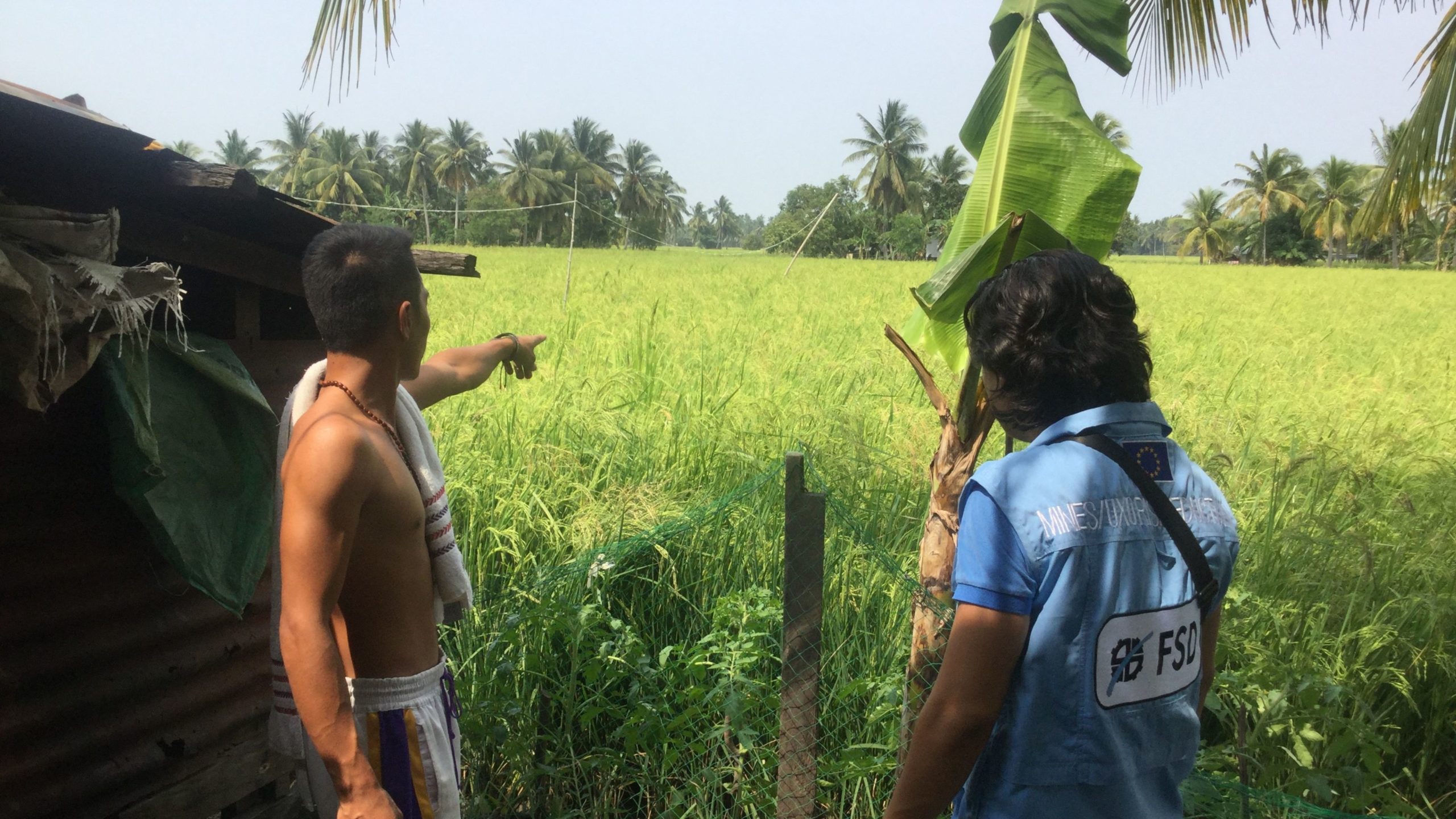

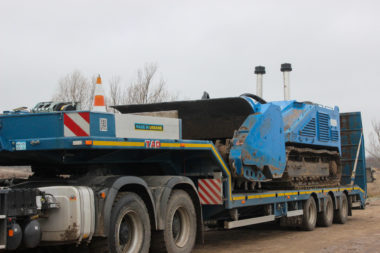

Mindanao: A New Operational Centre Enabling a Rapid Response to Explosive Risks
Until recently, many residents were reluctant to report the presence of these items, due to fear, mistrust, or a lack…
Humanitarian demining Non catégorisé Philippines

QR Codes to Save Lives
In Kharkiv province, Ukraine, residents live every day with the invisible yet very real presence of explosive remnants of war. FSD…
Prevention and risk education

FSD strengthens Ukraine’s mechanical demining capacity
FSD has launched a new project funded by the Swiss State Secretariat for Economic Affairs (SECO) to help the State…
Machines, drones and technology Humanitarian demining Non catégorisé